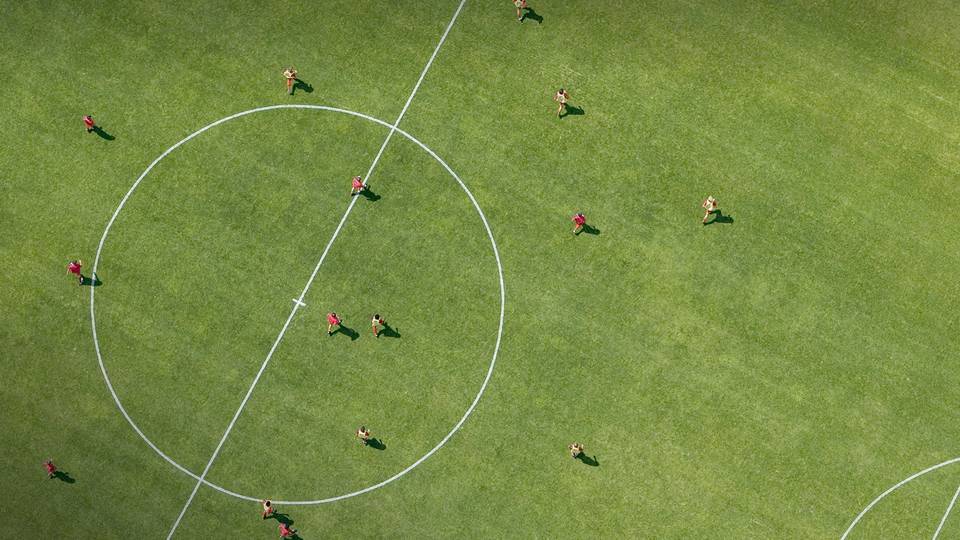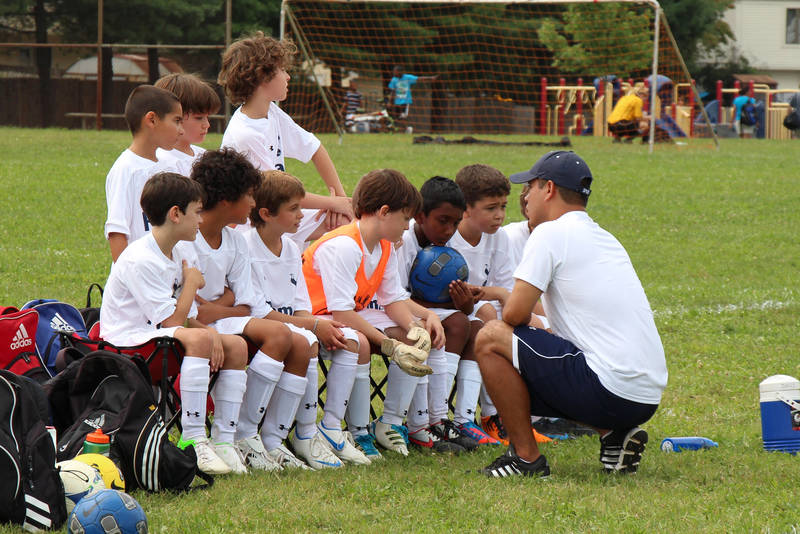Coaching U12 football presents a unique opportunity to develop young players at a critical stage in their development. Children at this age are typically more receptive to learning technical skills while beginning to understand tactical concepts that form the foundation of the beautiful game. Effective U12 coaching combines fun football drills with structured training sessions that focus on ball mastery, dribbling, turning, and basic positional awareness.
The transition from mini-football to the larger pitch brings new challenges and opportunities for coaches working with this age group. Many professional academies emphasise technical development at U12 level, incorporating exercises that build confidence on the ball before introducing more complex tactical elements. A balanced approach ensures players develop both individually and as team members.
While soccer terminology varies globally, the coaching principles remain consistent - create an encouraging environment where young players can express themselves while learning fundamental skills. Attending coaching courses specifically designed for youth development can significantly enhance a coach's ability to design age-appropriate sessions that maintain engagement while systematically building competence and confidence in players approaching their teenage years.
Understanding U12 Football Development
The U12 age group represents a crucial developmental stage for young footballers. During this period, players experience significant psychological and physical changes that directly impact their approach to the game and their ability to learn new skills.
Psychological Development in U12 Players
U12 players are developing greater self-awareness and social consciousness. They begin to understand complex tactical concepts and can follow more detailed instructions during training sessions. At this age, children display increased concentration spans and problem-solving abilities on the pitch.
Their emotional development is still evolving. Coaches should recognise that U12s may show inconsistent responses to feedback, sometimes appearing confident and other times requiring reassurance. These players thrive when given appropriate challenges that stretch their abilities without causing frustration.
Decision-making skills are rapidly improving. Coaches should incorporate activities that encourage players to think independently and make choices under varying degrees of pressure. This helps develop football intelligence and game understanding.
Group dynamics become increasingly important. U12 players care deeply about peer acceptance, making positive team environments essential for their development.
Physical Development and Safety
The U12 age group often represents the beginning of significant physical changes. Players may experience growth spurts at different rates, creating temporary coordination challenges and skill regression. Coaches must be patient during these periods.
Fundamental movement skills are still developing. Focus on:
- Agility and balance through varied movement exercises
- Coordination through technical ball work
- Speed development through short, explosive activities
Safety considerations are paramount. Training sessions should include proper warm-ups and cool-downs to protect growing bodies. Coaches should monitor training loads carefully to prevent overuse injuries, which are common in this age group.
The Foundation Phase (ages 8-12) represents the ideal window for skill development. U12 players can quickly acquire new technical abilities when training is appropriately structured. In some countries, this age group is sometimes called "the golden age of learning" in soccer development models.
Strength differences between players may become more apparent. Small-sided games with appropriately matched teams help ensure all players get meaningful involvement regardless of their physical maturation stage.
Essentials of U12 Football Coaching
U12 football coaching requires a balanced approach that develops technical skills, tactical awareness, and player confidence. Effective coaching at this age focuses on skill development while introducing more complex game concepts in a supportive environment.
Building Technical Skills
At the U12 level, technical skill development remains paramount. Coaches should prioritise drills that maximise ball contact time for every player. Avoid lines where children wait their turn; instead, ensure all players are actively engaged with a ball simultaneously.
Key technical areas to focus on include:
- Dribbling – close control, using both feet, changing direction
- Passing – short and medium-range with proper technique
- Receiving – controlling the ball with different body parts
- Shooting – proper technique and accuracy before power
Juggling challenges are excellent for developing ball feel and coordination. Set progressive targets for players to achieve and celebrate improvements rather than just raw ability.
Training sessions should incorporate these elements through game-like scenarios rather than isolated drills. This approach builds skills while maintaining engagement and fun.
Inculcating Tactical Knowledge
By U12, players are ready to grasp more sophisticated tactical concepts. Begin introducing positional awareness, team shape, and basic principles of play.
Key tactical elements to teach include:
- Attacking principles: width, depth, penetration
- Defensive principles: delay, cover, balance
- Transition moments: reactions when possession changes
Use small-sided games (4v4, 5v5) to reinforce these concepts, as they provide more touches and decision-making opportunities than full-sided matches. When explaining tactics, use clear, age-appropriate language.
Visual aids like cones, bibs and whiteboards can help players understand positioning. However, remember that U12 players learn best through doing rather than lengthy explanations.
Create game situations where players must solve tactical problems themselves, fostering decision-making abilities. This develops their football intelligence alongside physical skills.
Importance of Encouragement and Feedback
Positive reinforcement is crucial at this developmental stage. Players respond better to encouragement than criticism, particularly when learning new skills.
Effective feedback techniques include:
- Praise effort and problem-solving attempts, not just successful outcomes
- Use the "sandwich method": positive comment, constructive tip, positive comment
- Ask questions to develop players' understanding: "What might work better next time?"
Keep feedback brief and specific. "Great passing today, Tom" is less effective than "Tom, I liked how you looked up before passing to find teammates in space."
Create a supportive environment where mistakes are viewed as learning opportunities. This builds confidence and encourages players to try new skills without fear of failure. Remember that development happens at different rates, so celebrate individual progress.
Role of an Adult Member in U12 Teams
Adult members, whether coaches or support staff, play a critical role in creating a positive football environment. Their primary responsibility extends beyond technical coaching to fostering player development.
An effective adult member:
- Sets the tone – Models respectful behaviour, good sportsmanship and emotional control
- Maintains perspective – Emphasises development over winning
- Ensures safety – Both physical and emotional
- Communicates clearly – With players, parents and other coaches
When planning sessions, adult members should consider physical development stages. U12 players can have significant differences in size and maturity, requiring sensitivity when grouping players.
Parents should be educated about development goals rather than match results. A pre-season meeting explaining your coaching philosophy helps manage expectations. In the world of youth soccer (or football as it's known in the UK), having engaged but appropriate adult involvement creates the right foundation for long-term player development.
Planning Effective Training Sessions
Proper planning is essential for developing young footballers at the U12 age group. Well-structured sessions maximise player engagement and skill development while addressing fundamental technical and tactical elements of the game.
Session Structure and Duration
Training sessions for U12 players should typically last between 60-75 minutes, recognizing their developing attention spans and physical capabilities. A balanced session structure includes:
- Warm-up phase (10-15 minutes): Begin with dynamic movements and ball work to prepare physically and mentally.
- Technical practice (15-20 minutes): Focus on fundamental skills like passing, receiving and dribbling.
- Small-sided activities (20-25 minutes): Apply skills in game-like scenarios with clear constraints.
- Match play (15-20 minutes): End with small-sided matches that reinforce session themes.
Arrive early to arrange equipment and prepare the space. Professionals plan transitions between activities to maintain flow and minimise downtime.
Game-Based Learning
Game-based approaches provide context for technical development and decision-making. This methodology should:
- Use modified games with specific rules that emphasise desired behaviours.
- Create realistic situations where players solve problems they'll face in matches.
- Implement appropriate challenge levels—not too easy, not too difficult.
For example, a 4v4 possession game with limited touches encourages quick decision-making and improves first touch. Small-sided games (4v4 to 7v7) offer more ball contacts than full-sided matches and better replicate match intensity.
Questioning techniques enhance learning by guiding players to discover solutions rather than simply telling them what to do.
Focused Drills on Possession and Game Play
Possession-based activities develop technical ability and tactical understanding simultaneously. Effective drills include:
- Rondo variations (4v1, 5v2): Develop quick passing, movement and decision-making under pressure.
- Positional play exercises: Create numerical advantages (3v1, 4v2) in defined areas to practice maintaining possession.
- Directional games: Add targets or goals to combine possession with purposeful play.
Progression is crucial—start with simplified versions before adding complexity. For example, begin with a basic passing pattern before introducing defenders and directional constraints.
Each drill should relate to your session theme and ultimately connect to actual game scenarios. Provide clear, concise coaching points rather than constant instruction that might overwhelm young players.
Nutrition and Lifestyle
Proper nutrition and adequate rest are crucial foundations for young footballers' performance and development. These elements support physical growth, energy levels and recovery between training sessions.
Balanced Diet for Young Athletes
Young footballers need consistent energy to perform at their best during training and matches. A well-balanced diet should include carbohydrates for fuel, proteins for muscle growth and repair, and healthy fats for sustained energy.
Establishing regular meal times helps create good eating habits. Players should consume complex carbohydrates such as whole grains, brown rice and sweet potatoes to maintain energy levels throughout the day.
Protein sources like lean meats, fish, eggs and dairy help with muscle development and recovery. Young athletes should aim to include a protein source with each meal.
Fruits and vegetables provide essential vitamins and minerals that support immune function and overall health. Encourage at least five portions daily.
Key foods for young footballers:
- Whole grains and starchy vegetables
- Lean proteins (chicken, fish, beans)
- Fruits and vegetables
- Dairy or calcium-rich alternatives
- Healthy fats (nuts, avocados, olive oil)
Hydration is equally important. Players should drink water regularly throughout the day, not just during training sessions.
The Role of Rest and Recovery
Quality sleep is fundamental for young athletes' development. Children aged 10-12 typically need 9-12 hours of sleep each night for proper physical recovery and cognitive function.
Rest days are essential in a training schedule. These allow muscles to repair and strengthen, reducing injury risk. Even professional soccer academies build mandatory rest periods into their youth development programmes.
Active recovery, such as light swimming or gentle cycling, can help maintain fitness while allowing the body to recuperate. This should be low-intensity and enjoyable.
Stress management is often overlooked but vital for young players. Pressure from training, school and competitions can affect performance and wellbeing.
Recovery strategies for young players:
- Consistent sleep routine
- Proper post-exercise nutrition (within 30 minutes)
- Dynamic stretching before and static stretching after activity
- Adequate hydration
- Structured rest days
Encouraging young players to listen to their bodies helps develop self-awareness about fatigue and potential injuries.












